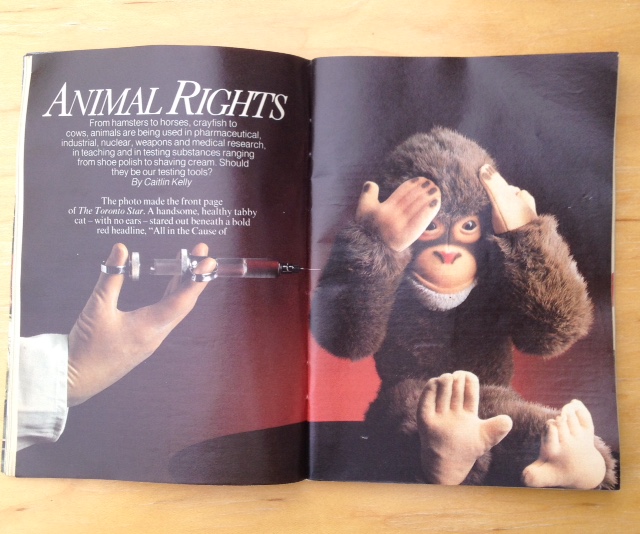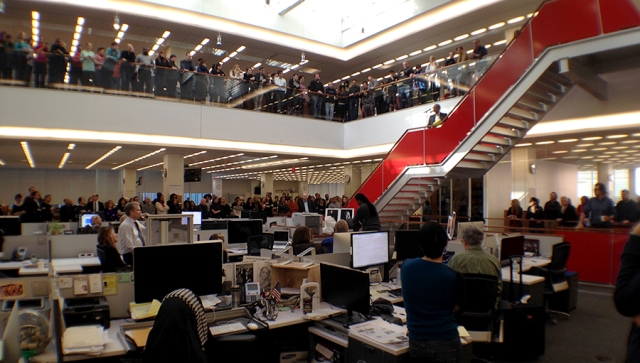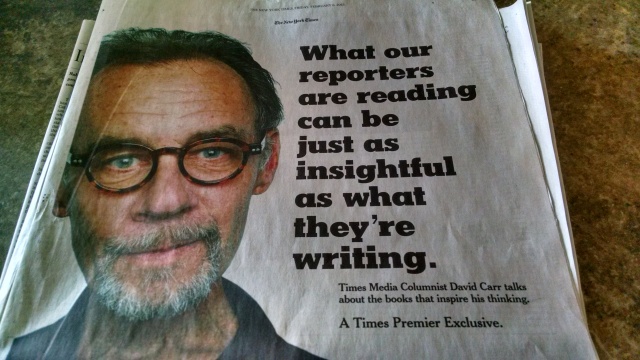By Caitlin Kelly

Here’s a recent story about what it feels like to be a reporter, a rare glimpse into the feelings we’re never allowed to share publicly:
Over the coming hours and days, millions of people are going to watch millions of hours and read millions of words on the Umpqua Community College shooting. They will learn what it looked like, from witnesses who escaped with their lives; they will learn about the victims—their lives, their hobbies, their dreams—from their friends and families; they will learn about the killer’s (or killers’) backgrounds and motives. Many of the same people who will eagerly consume this heartbreaking and enlightening information are the ones now criticizing the reporters gathering it for them. Where the fuck does the public think this news comes from?
The public may say it doesn’t want the horrible details; ratings, circulation, and traffic say the public is lying. The public may claim it values accuracy over speed, and that it is monstrous to contact witnesses this soon after a tragedy; the broad and voracious consumption of breaking reports, and the tendency to spread them as far and wide as possible, argue otherwise. The public will definitely immediately turn on CNN when news is breaking, then mock CNN for having clueless reporters uselessly speculate because there’s nothing to report yet, then turn to another channel to see if they’ve got something to report.
No outlet could conceivably think of sitting out the race to report something like this.
I’m grateful I’m no longer a hard news reporter, let alone at a tabloid — my last staff job, and literally my last staff position in journalism — ended in 2006. I was a reporter at the New York Daily News, then the U.S.’s 6th-largest daily newspaper.
It felt like an out-take from some 1930s film: tough-talking dames, foul-mouthed editors in suspenders, eager young interns, aggressive photographers. There was a guy in a corner of the enormous open newsroom called Gypsy.
I had only worked for broadsheets — The Globe and Mail, Montreal Gazette and, freelance, for The New York Times. Even at their most aggressive, we didn’t behave like tab reporters who would, and did, do anything to beat their competition and win the wood, the paper’s entire front page.
The news we all read, see and listen to doesn’t erupt spontaneously — it’s the result of decisions made by top editors, often middle-aged white men — about what they deem most important and interesting.

At the News, I was sent on a stake-out, in Manhattan’s summer heat and humidity, to stand outside a midtown hotel and await the arrival of two Quebecoise visitors, one of whom had been attacked and injured, not critically. I was sent because I speak French, not a common skill in that newsroom. My job was to — in News parlance — get the quote, some pithy summation of their fear and shock.
That no other reporter would have.
It was tiring, boring and bizarre to stand there for hours, to clog the sidewalk beside competing reporters from the Times, Post and others. With an intern, our photographer busy chatting to her pals, I tried to sneak into the hotel several times, eventually caught by an irate security guard.
I’ve never felt so stupid or ashamed of my role.
When there’s a shooting — which in the U.S. is sadly common — reporters descend on the scene, desperate to speak to anyone involved and to be aggressive about it.
Because if they’re not, and a competitor for eyeballs, clicks, pageviews and revenue beats them to a source, they’re in deep shit.
Hence the comparison made to vultures — journalists swooping in the second they see blood, death, destruction, tragedy, to dig through its entrails and feast.
Some reporters are fine with this behavior. I’m not.
Partly because there are complex issues that rarely get discussed outside of newsrooms or journalism conferences: what to cover, when to cover and when to stop, what to ask.
Because the assumption is: everything, as fast as possible.
One reason reporters can look like vultures is that those of us working differently, not on breaking news — writing longer features or profiles, covering business or sports or government — remain invisible to the public.
We spend our days ferreting out information we hope will be useful, not merely that hour’s latest tragedy, which can appear titillating or voyeuristic.
So, the public often think “the media” are only those they suddenly come into contact with when we’re at our most aggressive and, yes, our ugliest.
When I teach journalism, I also remind my students — especially women — that we’re paid to break social rules: to run across a room, to interrupt, to ask tough, probing questions, repeatedly when necessary, to challenge authority, whether political, religious or the wealthy.
At our best, to speak truth to power.
That, too, sometimes offends the more decorous or docile.
Reporters don’t contact victims and bystanders because they get off on it; they do it because they’re a small part of a long-established news ecosystem that begins and ends with an audience that understandably wants to know what the facts are, which is to say that it wants to hear what victims and bystanders saw.
I got out of tabloid reporting because I couldn’t take feeling awful anymore. One former co-worker said she got out of it the moment she realized she had been doing it long enough to stop feeling awful.
But…I draw a line that others are failing to do now.
I do not want sentimentality or hand-wringing.
I do not want to hear one more slick television reporter — NBC Nightly News, I’m looking at you — yammer on inanely about a community’s gathering together to “heal.”

I’m so done with cliches, false emotion and bullshit.
Here’s what I want from fellow journalists:
— Insight, analysis, hard data, fact patterns, trends.
Here’s what I don’t want:
— Drama, emotion, speculation, guessing, uninformed opinion.
What do you think of reporters’ behavior?
Do you watch or listen to the news?
What do you find missing — or most valuable?

I’ve stopped listening and watching the news because of all the behaviors you write about here. What I find valuable are insights like yours.. Many thanks.
Thanks, Ann. I suspect many people feel as you do, and that bothers me. I love what I do, but have real issues with some of how it’s done.
I wish more journalists spoke out truthfully — but they’re either 100% in agreement with the way things are done, or, more realistically, want to keep their seat at the table when there are few good jobs in our industry.
I understand. I love what I do, too — I’m an individual and group psychotherapist and I try to help people let go of anxiety about living in today’s world. Honestly, many people report that they feel less anxious when they reduce how much news they watch.
I have NO doubt of that. The narrow/outdated definition of news focuses on tragedy, drama, conflict, violence.
I suffered secondary trauma after thinking about guns and gun violence for my first book. Very aware of it now.
I talk to people about reducing personal “cognitive distortions” like blaming, all-or-nothing thinking, overgeneralizing, fortune-telling, catastrophizing, mind-reading, maximizing/minimizing, etc. and those cognitive distortions are all there, way too much, in how news gets reported today.
So interesting to read it through your lens of professional training.
I wish you’d go speak at a few journalism conferences using this language! Or do a guest blog post at CJR or Poynter….both sites well read by working journalists.
Okay! I love speaking and writing my thoughts — I’ve been blogging daily since January 1, 2013. I’m so glad we’re communicating here today.
I suggest you contact them directly — and suggest a guest post. They may say no (journalism groupthink is appalling) but might be worth it. I would also suggest tweeting it with #journalism #journalists.
Wonderful, I love your blog! Mind checking out mine? https://iamjishnu.wordpress.com
When I was younger, actually I’m still young, but I was unaware of the politics in reporters until I read about Rita Skeeter in Harry Potter. Mind you, I was seven at the time, but my view on them is still the same. I’m not sure if you’ve read HP, but Rita Skeeter turns herself into a beetle to eavesdrop on conversations. She also uses a Quick Quotes Quill that adds a load of B.S. (excuse my language) into her articles. Some reporters, reporting on individuals or “hard news” do this. But many of them, including Bob Woodward in my opinion, use what you said, like hard data and trends. Thanks for the great post!
Love,
Aditi
~~If you’re interested, I’d love it if you could check out my blog, http://www.pallodium.wordpress.com a recollection of my teenage thoughts, using numerous lenses. 🙂 ~~
I wonder how many people think of journalists from HP books!
The UK press are notorious for dirty tricks that many U.S.reporters wouldn’t dare…like hacking into people’s phone emails.
Really?? Because I’m from the U.S., I didn’t know that! Thanks! 🙂
Love,
Aditi
~~If you’re interested, I’d love it if you could check out my blog, http://www.pallodium.wordpress.com a recollection of my teenage thoughts, using numerous lenses. 🙂 ~~
i have always loved the news. especially the papers. i miss the everyday delivery of my paper, loved reading it, discussing it, taking my time. news is delivered so quickly now, and it seems without thought at times, only a competition for who broke the story first. it seems to lack the integrity of old, quotes and sources aren’t double-checked, there is a lot of speculation and opinion and the stories are rushed. i miss real journalism, with the facts and human factor taken into consideration. i still continue to watch and listen and read the news, as i love it, but find little that lives up to the standards i once enjoyed.
The only newspapers I read are the NYT, WSJ, FT and WashPost…Occasionally the LA Times and Guardian and Globe and Mail (Canada.) I almost never look at news websites.
I’m proud of my 20+ yrs freelancing for the NYT as they are scarily fussy. That’s a good thing. 🙂
i think you were, and are, one of the good ones, of the highest integrity.
Thanks. My husband and I feel like real dinosaurs at this point. 🙂
I’m increasingly troubled by the way in which politics is reported – here in the UK it’s ever more opinion and speculation, ever less facts and details, which is creating some alarming biases.
And the British press are, like other Europeans, far less objective (or expected to be) than here in the U.S. One of my writing adjustments when I came here from Canada was having to do a LOT more attribution — i.e. who said what.
I’ve found that quite a culture shock when dealing with American magazines – the things you have to be able to reference, that over here wouldn’t need it. I only normally bother to reference specific quotes, or obscure things that can’t be found in a few seconds with a search engine.
Berlitz teaches low and high context cultures. I forget which is which (France is opposite of US, for example) — but American culture is huge on explaining everything.
that explains a lot!
but then I’m talking about ideas and broad brush stroke things for the greater part, not specific economic policies.
Speaking Truth to Power is a Myth:
” Top editors, middle aged and white” who decide what is published.
Where does “Top” apply here? Then most media are herd media and editors are “Top” heavy with censorship of truth and bloated with PC exploitation directed at any alternatives.
Where are the journalists who speak truth to power ?
There is no fourth estate to challenge power or corruption in Ireland.
Where is this myth supposed to exist in the USA? …Outside the class room?
maybe it is time for Universities to begin a course in true journalism. A first for all universities.
First tentative step would require a ban on all corporate funded competitions with attendant corporate prizes and offers of further employment.
Second step involves searching and advertising for alternative perspectives on every possible subject and start real debate and actual education on journalism, on things such as balance,and aspirations of objectivity.
At some early stage of speaking truth to students all tutors, professors etc will be ejected from that university and black listed.
“Talk truth” is an aspiration. Tutors and Universities are not permitted / are absolutely forbidden to speak truth even ( especially) to students.
How many Professors have been sacked for online comments involving anti establishment writings? There is one, singular World view permitted OK, got it …
You ask politely for establishment hand outs, comments etc and you copy verbatim …Right!
Satire
Dandahan4.com
Thanks for weighing in.
These have been debated for many many years.
I agree with some of your points.
“These have been debated for many years ..,”
What may have been debated was whispered debate, in secret and in fear.
As the author of this blog has glanced over the subject of never challenging power as a journalist.
The subject has never been openly addressed.
I am open to enlightenment … Where is that debate happening ?
Where is that fourth estate?
Satire
Dandahan4.com
Are you a working journalist?
These conversations are not “whispered in secret and fear” — at least not in North America where I work. Perhaps in other countries, and, quite likely so, given that journalists are killed because of their work in places like Mexico, Syria, Iraq and the Philippines.
Some journalists write about make-up and fashion; others spend months, even years, doing investigative work, challenging government secrecy and corporate malfeasance. There is no single definition of what it means to be “a journalist” so I have no single broad-brush answer to your question.
https://www.hrw.org/news/2014/05/02/why-we-need-journalism
Reblogged this on LIFE OUTSIDE : [ The Politically Correct (Tyranny of The Mind) ] and commented:
The Fourth Estate is a Myth.
Who speaks truth to power?
I think speculation and guessing have come as part and parcel of the 24-hour constancy of news. We put people on air and expect them to yammer on for hours–when there is no new development to discuss. Ridiculous . . .
Good point.
I very rarely watch TV news.
I suppose it’s no different than if we were to judge doctors by whether or not they were narcissistic cosmetic surgeons or are working with Doctors Without Borders. One thing is for sure, American media companies probably attempt to bend coverage to their corporate will more than countries that have broadcasters like the CBC and BBC. We ascribe a higher moral standard to those who are doing socially progressive work. I also think that the new ‘fast food journalism’ of Gawker, Buzzfeed, and even UpWorthy (if you can call any of that ‘journalism’) is pure junk info-tainment (and I have no idea what exactly the revenue stream might be). We are entering a time where if a major event happens, that it might actually be broken on social media or ‘eyewitness journalism.’ Putting the pieces back together again will rely on rational, contextual analysis that is free from the emotion of the moment (if that’s at all possible). I’m not sure how many people have the patience for that sort of thing; even news analysis seems to be an industry unto itself these days.We also live in a time where a major shaper of news stories has ‘fair and balanced’ as its almost Orwellian tag-line, as if the job that other media outlets are doing is neither.
Thanks.
I’m at a point of real frustration trying to find “news” that isn’t sentimental garbage or parochial. I agree that CBC can be excellent (I soaked up a great edition of The Current recently about the oil bust in Alberta while I was in Ontario) and BBC as well. I should be less lazy and read in French and Spanish to get some other perspectives as well.
You and I both know that “news” is a construct anyway. Depressing.
Pingback: [BLOG] Some Wednesday links | A Bit More Detail
This article was extremely informative. Interesting perspective regarding this quote “we’re paid to break social rules: to run across a room, to interrupt, to ask tough, probing questions, repeatedly when necessary, to challenge authority, whether political, religious or the wealthy.” The more people that look through this lens when it comes to media, the more we can learn from this.
Thanks!
Very few people seem to understand what we do or why. I think many people understand what teachers or lawyers or bus drivers do! But when people have no idea about media, it’s deliciously tempting to shriek FAKE NEWS when they have no idea what real news-gathering even entails.